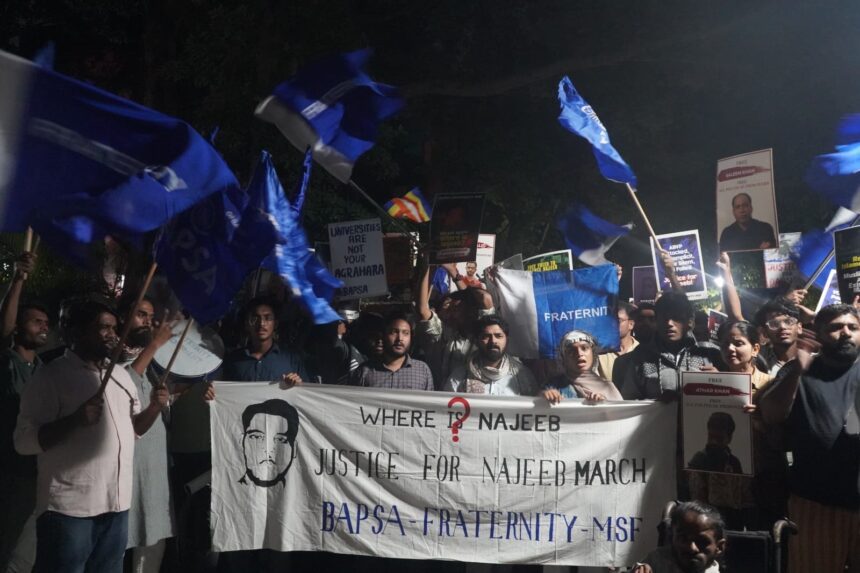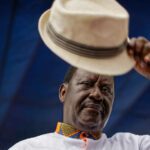As October 15 marks the ninth anniversary of the forced disappearance of Jawaharlal Nehru University (JNU) student Najeeb Ahmed, the campus reverberated with calls for justice. Members of the Birsa Ambedkar Phule Students’ Association (BAPSA), the Fraternity Movement, and the Muslim Students Federation (MSF) organized a “Justice for Najeeb” march on Tuesday, echoing the poignant question, “Where is Najeeb?”
Najeeb Ahmed, a first-year MSc Biotechnology student from Badaun, Uttar Pradesh, was last seen outside his hostel in 2016. It is alleged that he was abducted by members of the Akhil Bharatiya Vidyarthi Parishad (ABVP), the student wing of the Hindutva organization Rashtriya Swayamsevak Sangh (RSS). Multiple investigations by agencies such as the Delhi Police, Special Investigation Team, Crime Branch, and the Central Bureau of Investigation (CBI) have been unable to locate him, leaving his fate unknown after nine years.
In a previous interview with Maktoob, Fatima Nafees, Najeeb’s mother, expressed her belief that he is still alive, despite the investigative agencies’ failure to meet her hopes for justice. In June 2025, a Delhi court accepted the CBI’s closure report in the unresolved case.
The march commenced at Ganga Dhaba and passed through various hostels, including Mahi-Mandvi, from which Najeeb vanished. Students raised slogans demanding accountability, asking, “Where is Najeeb?” and expressing dissatisfaction with the Delhi Police and CBI.
BAPSA JNU President Avichal Warke emphasized, “We have gathered here to demand a single, urgent answer: Where is Najeeb?” He accused ABVP members of initially assaulting Najeeb and then threatening him with disappearance. Warke criticized the leftist organizations, alleging they perpetuated a narrative that portrayed Najeeb as “mentally unstable,” thereby obstructing the inquiry.
Ambedkarite activist Yogendra condemned victim-blaming as reflective of the “state mechanism,” adding that even leftists have legitimized such narratives. He urged that the struggle is not individual but affects all marginalized groups, noting, “Dalits, Adivasis, Muslims, and women face oppression.”
Fraternity Movement’s General Secretary Mohammed Alfauz Azmi reiterated allegations against the JNUSU for representing Najeeb as the instigator and questioned if they would ever retract their statements. He also called out liberal perspectives that ignore the significance of religious identity in hate crimes.
SIO National President Abdul Hafeez claimed the events leading to Najeeb’s disappearance were a calculated conspiracy intended to instill fear among marginalized groups on campus. He highlighted the persistent struggle of Nafees, who has remained steadfast despite her grief.
Hafeez asserted the disappearance and related institutional failures exemplify deep societal issues regarding identity for Muslims, Dalits, and other marginalized communities. MSF’s Shahid emphasized the continued absence of clarity surrounding Najeeb’s fate and discussed the impact on victims’ families, reaffirming their collective refusal to forget.
The march included powerful spoken word performances, with participants articulating the ongoing significance of Najeeb’s story as a symbol of resistance against systemic injustice. The students expanded their demands to include the release of jailed anti-CAA activists and expressed solidarity with the Palestinian cause.
Meanwhile, the JNU Students Union plans a candlelight vigil on October 17, under hashtags #WhereIsOurNajeeb and #BringBackNajeeb, continuing the push for answers from the authorities.
Najeeb Ahmed’s case has become a focal point of campus violence, highlighting institutional bias and failures within the justice system. The incident began with a physical confrontation allegedly involving ABVP members during a student election campaign, which turned into a brutal assault, accompanied by derogatory taunts linked to Najeeb’s identity.
Despite extensive investigative efforts, including CCTV analysis and substantial incentives for information, Najeeb’s whereabouts remain unknown. His story has evolved into a significant narrative regarding the treatment of Muslim students in India’s educational institutions and the broader implications of communal violence.
In the words of Fatima Nafees, “As long as I am alive, I will keep speaking out about what happened to my son,” reflecting the enduring quest for justice and recognition surrounding Najeeb’s disappearance.
Tags: JNU, Najeeb Ahmed, disappearance, student protest, justice
Hashtags: #years #JNU #students #march #demanding #answers #Najeeb #Ahmeds #disappearance










